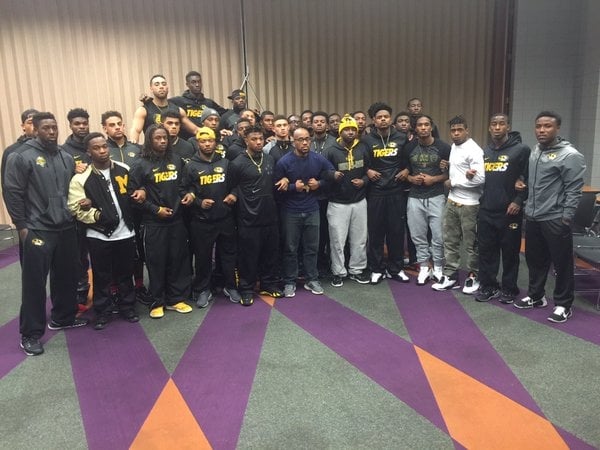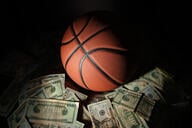You have /5 articles left.
Sign up for a free account or log in.

When Tim Wolfe announced his resignation as the University of Missouri System’s president on Monday, the decision came after weeks of demonstrations over the president’s handling of a string of racist incidents on campus. Student and faculty groups had been calling for Wolfe’s resignation, and a graduate student went on a week-long hunger strike, vowing he would not eat until Wolfe was “removed from office or my internal organs fail and my life is lost.”
Then, on Saturday, Nov. 7, at least 30 members of the university’s football team linked arms with the hunger striker and gave an ultimatum: if Wolfe didn’t resign, they would boycott all football-related activities. That included a game scheduled for this coming Saturday. While it would be an exaggeration to attribute Wolfe's resignation -- and that of the Columbia campus's chancellor, R. Bowen Loftin, which will be at the end of the year -- largely to the players' actions (as some have), their strike certainly helped tipped the scales.
And the success of the players’ boycott could have important ramifications for college sports.
“I think the power that players have has always existed, but rarely do you see it channeled in this way,” said Ramogi Huma, president of the National College Players Association and a former University of California at Los Angeles football player. “This really could signal to athletes that every player has this power, especially those in high-revenue sports.”
Huma was one of the architects of the recent attempt to unionize football players at Northwestern University. He said the Missouri boycott demonstrates just how much sway athletes have on campus after years of institutions pushing sports like football and basketball to become, as athletics directors are inclined to say, the “front porch of the university.”
Huma said the boycott is “clearly transferrable to the college athletes’ rights movement.” Imagine, he said, this sort of boycott happening at a university over its concussion policies or athletic scholarship levels.
“I think this brings us one step closer to understanding that power, and this could plant those kinds of seeds at various campuses,” Huma said. “We haven’t advocated for striking, as it does take a lot of courage and it is risky, but it could end up being a silver bullet on these issues.”
Helping the players at Missouri, Huma said, was the support of their coach and, perhaps most importantly, the amount of money the university stood to lose if the players had boycotted this weekend’s game. Though Missouri has struggled to win this season, had the strike taken place, the university would have owed Brigham Young University $1 million, per the two universities' game contract. “There’s a lot hanging in the balance when there’s so much money at stake,” Huma said.
Even at smaller institutions, football is an important and visible part of the university, however, and the Missouri boycott is not the first time in recent years that players have gone on strike. In 2013, players at Grambling State University, a historically black institution in Louisiana, boycotted football over administrators’ refusal to address poor facility conditions, excessively long travel to games and other issues.
The boycott caused the university to forfeit a game against Jackson State University, leading to a lawsuit against Grambling State. The game was meant to be Jackson State’s homecoming, and that university said the Grambling team’s no-show performance cost it millions of dollars.
It’s the economic impact players have on a university -- whether at a large football program like Missouri or a smaller institution, like Grambling State -- that can empower athletes to take a stand, said Dan Lebowitz, executive director of Northeastern University's Center for the Study of Sport in Society. If there was any doubt among players of this fact, the Missouri boycott could help change that, he said.
“This could have massive implications for college sports, especially those in the major five conferences,” Lebowitz said. “I think you’re going to really start seeing athletes understand the power this system has given them because of the economics now involved.”
And that won’t apply only to social justice issues. The fact that a university stands to lose so much money when athletes decide not to play a game raises questions about their roles as students, Lebowitz said.
“I think it could regalvanize the movement for paying athletes,” he said. “I think you're going to start seeing a new way of looking at the student-athlete structure and whether or not athletes are in large respect employees that deserve to be paid. It’s hard to argue they’re not when they have this kind of economic power.”




